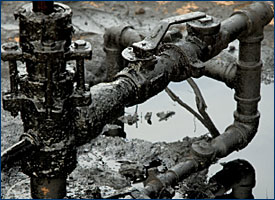Ecological Challenge: Overconsumption
Disasters and Solutions — Part 1
Ecological Challenge: Overconsumption
Back in the late 1980s we did an autopsy of the Exxon Valdez disaster. Six months following the terrible spill, we flew out to a remote beach in the Aleutian Islands only to find ourselves picking up massive scoops of undiluted oil. This was 2,000 miles from Valdez. Now, estimates suggest the oil will hit the Gulf currents and could potentially travel across the Atlantic, hitting Ireland, the UK, passing Gibraltar and transmigrating all the way to the coast of Israel, not to mention the devastation surrounding Hispaniola, Cuba, and most of the Caribbean hotspot locales.
 But back in the late 1980s, the Japanese Environmental Protection Agency (an offspring of the first EPA, created in the U.S. under the Nixon administration) had already determined that an approximately one millimeter of petroleum pollution covered the planet’s more than 70 percent marine environs. Moreover, some 10,000 oil and chemical spills were occurring every year, though were rarely mentioned in the media. Also in the late 1980s and early 1900s, NASA covered up the extent of the stratospheric ozone depletion rates, as the holes over Antarctica, and then the Arctic, as well as much of Australia, New Zealand, even the Swiss Alps and Southern California, grew larger and larger.
But back in the late 1980s, the Japanese Environmental Protection Agency (an offspring of the first EPA, created in the U.S. under the Nixon administration) had already determined that an approximately one millimeter of petroleum pollution covered the planet’s more than 70 percent marine environs. Moreover, some 10,000 oil and chemical spills were occurring every year, though were rarely mentioned in the media. Also in the late 1980s and early 1900s, NASA covered up the extent of the stratospheric ozone depletion rates, as the holes over Antarctica, and then the Arctic, as well as much of Australia, New Zealand, even the Swiss Alps and Southern California, grew larger and larger.
Now we add to this conservation conundrum, and the notion of a spiritual entity greater than our collective selves, the realization that we have indeed unleashed the previously referred to current extinction spasm and there would seem to be little comfort in the fact that Gaia, Mother Earth, may well be hoping and waiting for our species to disappear as quickly as possible. Indeed, our global fertility rates, still over three children per couple, on average, suggests that we will multiply in such quantities, translated into so massive a consumptive burden, as to all but denude every last place of wildness, every species that gets in our way, or can be consumed.
Of course, the Earth is also patient and, one might conclude, even understanding. Perhaps she recognizes, has even preconditioned our ecological schizophrenia. One can only pray that she will withstand the countless assaults on all sides; and that a representative selection of her precious life forms will survive our brief occupancy and usurpation of what biologists call Net Primary Production (“NPP”), that amount of green space (chlorophyll producing biomass) that we have usurped in our hell-bent, can-do insistence on optimizing the economics of the environment to suit our addiction to comfort. But who — other than great ecologists like Dr. Joyce Poole, or Dr. Marc Bekoff, or Dr. Con Slobodchikoff — have ever stepped back from those addictions to assiduously merge their psyches with those of elephants, coyotes and prairie dogs, so as to come out whole; to corroborate that brilliant message from Hegel that Sartre drew upon, namely, as prescribed in the ancient Greek definition of agape, that one’s soul is only expressed when it selflessly engages another’s soul; grants full moral status and appropriate reciprocity to all other life forms, as the Jain monks have come to emblemize.
Part 2: Biodiversity Successes and Failures
Comments Off
